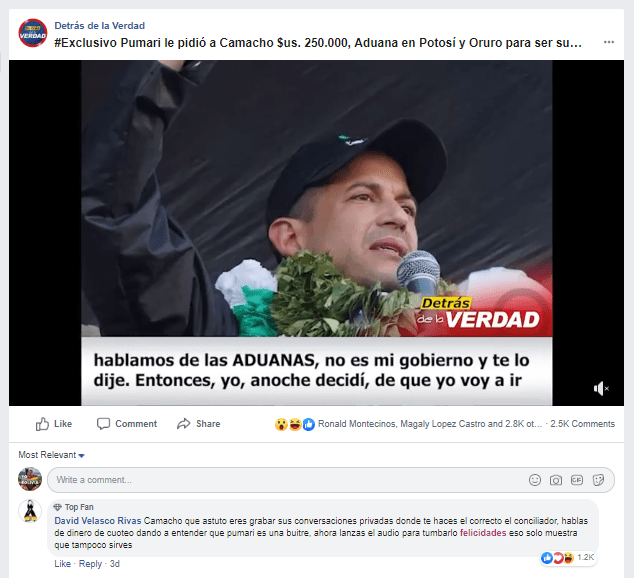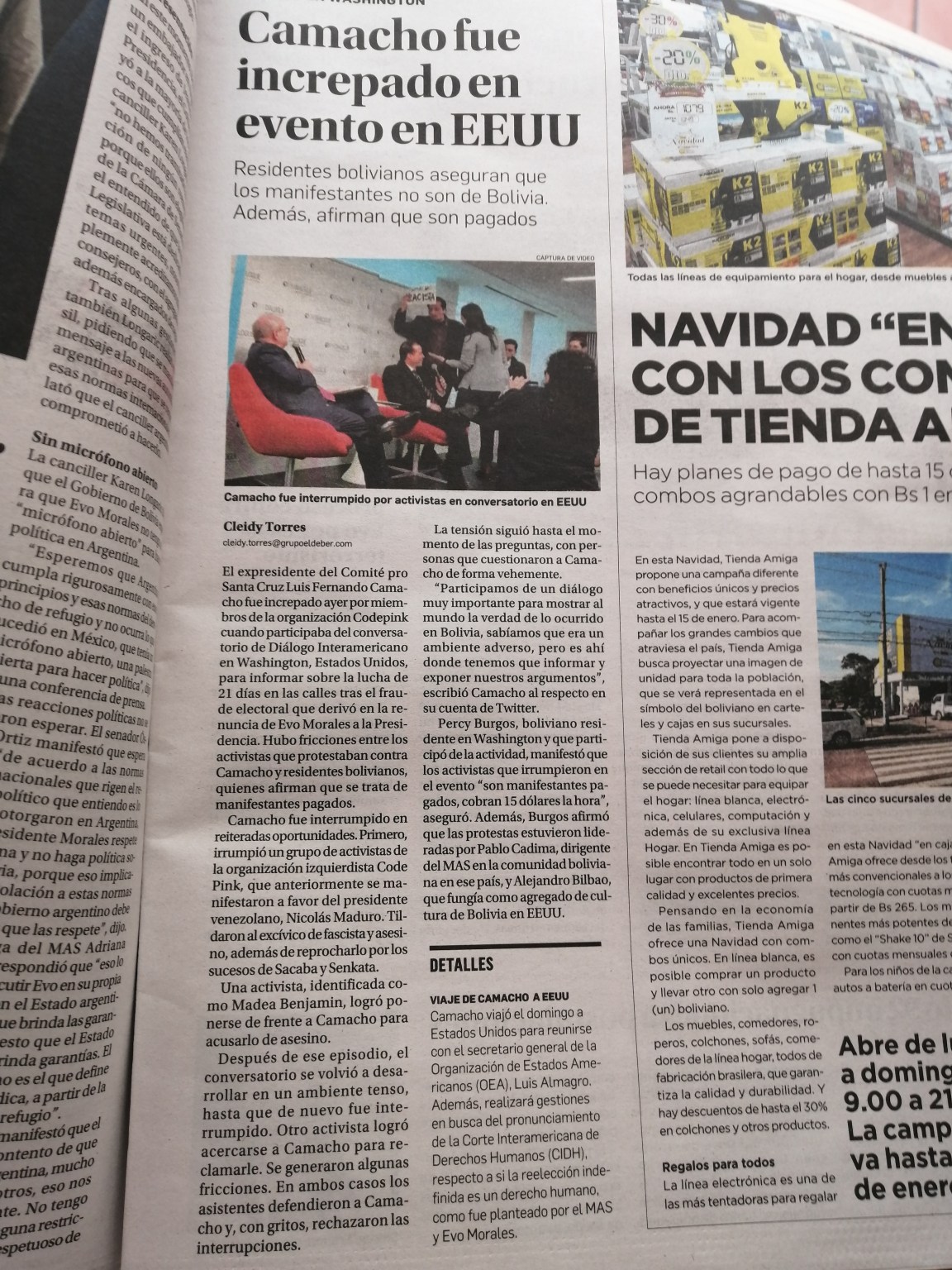Above Photo: From Thegrayzone.com
Humiliating scandals are destroying right-wing leader Luis Fernando Camacho and the right is fracturing as a more militant MAS party readies for an uphill election battle.
La Paz, Bolivia – Just one month after ruling elites and right-wing politicians seized power in Bolivia with a military coup, the fragile unity they briefly enjoyed has erupted into a bitter public feud.
Local analysts had predicted that coup leader Luis Fernando Camacho and businessman Marco Pumari could unite the right from the country’s east and west, both indigenous and white or mestizo. They were seen as an insurmountable dream team.
That alliance now lies smoldering, with the two presidential frontrunners openly airing their dirty laundry amid a vicious power struggle.
The battle between the two right-wing heavyweights began when Camacho secretly taped and leaked a conversation in which he accused Pumari of soliciting a bribe of $250,000 and control of two customs checkpoints in return for his spot on the presidential ticket. Camacho fervently denied leaking the tape, which has left Pumari’s presidential aspirations in shambles.
But just days after right-wing CNN personality Fernando del Rincón shared a stage and smile with Camacho, while accepting an award from his far-right Santa Cruz Civic Committee for his part in helping “save democracy,” del Rincón dropped a bomb.
In a live December 13 interview on CNN en Español, del Rincón confronted Camacho over sending him the tape.
A flabbergasted Camacho insisted that the hotel in which he and Pumari met must have recorded the audio, because he had actually sent Rincon a different secretly recorded tape of his closest political ally — an accusation which the Hotel immediately and flatly denied.
Amazing—watch as a flabbergasted Camacho is confronted live on air after boldly telling *the same CNN reporter he leaked the Pumari tape to* that he didn’t know about it
Then he tries to cover by saying he actually sent him a DIFFERENT secretly-recorded tape of his closest ally! pic.twitter.com/fsycKUZ8GT
— Wyatt Reed (@wyattreed13) December 14, 2019
From right-wing golden boy to “damaged goods”
Luis Fernando Camacho rose to political prominence months ago, but cemented his status as coup figurehead after he broke into the Palacio Quemado, Bolivia’s presidential palace, with police assistance. In a bizarre act of colonialist kabuki theater, he placed a Bolivian flag and enormous Bible on the floor and declared that God had returned to the Presidential Palace.
Moments later, the pastor by Camacho’s side promised that “Pachamama will never return to the palace,” in a reference to the Andean spirit of Mother Earth.
As the former leader of the undeniably fascistic Union Juvenil Crucenista paramilitary and the separatist Santa Cruz Committee, Camacho has struggled to shake off a history of white supremacy and anti-indigenous violence.
Marco Pumari, as the leader of the rightist Potosi Civic Committee, purports to speak for the “real indigenous people” – in contrast to supposedly ‘fake indigenous’ President Evo Morales. As such, Pumari would have offered political cover to Camacho’s campaign and helped to divert indigenous voters away from Morales’ leftist party Movement Toward Socialism (MAS).
But on December 7 Camacho announced he was running on his own, leading Pumari to lament that “without hearing my position, the decision was made… I was surprised by the decision of Luis Fernando Camacho.”
The numerically miniscule Civic Committee of Potosi, Pumari’s only real constituency, had refused to play ball. They decided Pumari would be president or nothing at all.
In the end, the very real threat that the far-right civic committee leaders would take the presidency now appears to have come undone thanks entirely to their own selfishness. Much like the right-wing opposition in Nicaragua and Venezuela, their failure to capitalize on momentary success orchestrated by outside imperialist powers and a near inescapable chorus of complicit media seem to have boiled down to pure self-interest.
In an attempt to justify this decision, Camacho, or someone close to him, leaked a recorded conversation between the two men in which Camacho accuses Pumari of attempting to solicit a $250,000 bribe in return for his presence on the presidential ticket.
Furthermore, the tape revealed that Pumari had demanded control of a number of Aduanas, the customs checkpoints which oversee the taxation of all incoming commercial traffic, in what would have been a highly lucrative side hustle for the right-wing political operator. In that recording, Pumari did not deny soliciting the kickbacks but insisted he had plans to spend the proceeds on campaign expenses.
Coup supporters are now taking to social media in a collective meltdown. They are furious that they are forced to pick between an increasingly fractured field of candidates that seems hellbent on splitting, amoeba-like, from one to two candidates – and soon, potentially, four.

In what could be the final nail in the coffin for Camacho, allegations of domestic abuse by Camacho’s ex-wife leaked out to the media.
Adding insult to the serial tax-evading multimillionaire’s injury, Camacho’s December 12 talk at the US government-funded think tank the Inter-American Dialogue in Washington, DC descended into utter chaos when a group of Bolivian and US anti-imperialist activists prevented him from talking with sustained protests.
State propaganda outlets in Bolivian attempted to mitigate the damage by accusing the activists of being paid $15-an-hour by unspecified sources, citing US-based pro-coup Bolivia expats and claiming no Bolivians were part of the protests, despite clear visual evidence to the contrary.

But the ruses are wearing thin, even for erstwhile Camacho supporters.
“Camacho is damaged goods now, just like Mesa,” one upper-class coup supporter from Santa Cruz remarked to me this week outside a ritzy bar in Cochabamba. He sat in glum silence as his outraged companion thrust his phone in my face and attempted to walked me through The Grayzones’s prior coverage of the well-to-do far-right candidate.
He looked ashen as his friend shook his head and displayed the video of Camacho’s Union Juventud Cruceñista disciples sieg-heiling. “There’s no one we can vote for,” he lamented.

Within the span of just a week, Camacho and Pumari have gone from theoretical frontrunners to national laughingstocks.
In an attempt to stanch the bleeding, Waldo Albarracín, the president of the National Committee for the Defense of Democracy, perhaps the closest analogue to a civic committee that exists in La Paz, referred to both men as “unethical and antidemocratic” and urged them to step aside.
The main beneficiary in all this is likely to be Carlos Mesa, the man best positioned to take advantage of what’s rapidly become a civil war among the far-right.
And a minister recently fired by self-declared “interim president” Jeanine Añez insists she intends to run as well. Although Añes has publicly downplayed the prospect, indicating in a fawning hagiography by state propaganda outlet Pagina Siete that doing so would be “dishonest,” the likelihood seriously increases as the other far-right presidential hopefuls continue to destroy one another’s careers.
Korean-Bolivian evangelical magnate Chi Hyun Chung, a renowned misogynist and anti-indigenous bigot, has thrown his hat in the ring as well. Chung managed to pull 8 percent of the votes in the October elections, which Evo Morales won handily before his deposition amid fabricated charges of electoral fraud.
But the ranks of Chung’s far-right supporters have dwindled after he was the only opposition figure to to accept Evo Morales’ call for dialogue. In fact, now his own Democratic Christian Party refuses to endorse him. At best, he can play a spoiler role, further splitting the right.
MAS re-emerges from the coup more militant and motivated for victory
In Cochabamba on December 7, thousands of members of Bolivia’s MAS party descended on the Coliseo de la Coronilla to determine the future of the left-wing political powerhouse, which led the impoverished Latin American country to unprecedented levels of shared prosperity under the tutelage of President Evo Morales.
From exile in Mexico, Morales phoned in to announce to raucous cheers that he had accepted his nomination as MAS campaign director for the upcoming proposed elections. Outside, vendors hawking indigenous Wiphala flags and DVDs documenting the recent army massacres in Sacana and Senkata struggled to be heard above the roar of flyovers by Bolivian military, who buzzed the massive crowd periodically with the same aircraft the military used to unleash death upon MAS members protesting the coup weeks ago.
Despite the aggressive surveillance, the mood inside was electric. A packed stadium of jubilant supporters bearing flags representing the party and the country’s indigenous population cheered as a succession of leaders from the party, and the social movements at its core, took to the stage to denounce the coup-mongers’ attempts to purge its ranks from the spheres of power in Bolivia. And above all, they urged unity.
A packed house at the mass meeting of the MAS in Cochabamba, where Evo Morales’ party is deciding how to navigate the junta’s planned elections. Morales called in to thank supporters, urged unity, then MAS frontrunner Andronico Rodriguez brought the house down w/ a rousing speech pic.twitter.com/w5JijkrPMq
— Wyatt Reed (@wyattreed13) December 7, 2019
In spite of its forced removal from power, MAS is poised to emerge from the US-backed coup with an unprecedented level of organizational rigor.
“This moment, that’s so crucial to our homeland, needs us all united” announced Andronico Rodriguez, the frontrunner for the MAS presidential nomination. “There will be another moment soon to deal with our weaknesses and errors, and of course the traitors and opportunists we’ve endured this whole time.”
But with the Añez coup regime having essentially criminalized basic political organizing, the question remains: Can the upcoming elections even be trusted, given the level of political repression leftists leaders face on a daily basis? Will the elections be clean?
“We hope they’ll be clean — that’s what the people deserve,” former Bolivian Foreign Relations Minister Fernando Huanacuni told me as the convention was winding down. “If they [the coup government] talk about democracy, it has to be a transparent democracy for everyone.”
Juanita Ancieta, the MAS party’s national secretary for international relations, made it clear that absent protection from the police and military, members of MAS would find other ways to ensure their own safety. “If something happens, if someone is threatened, if someone is kidnapped, we’re going to rise up in defense of that brother or sister,” she said.
In regards to whether the elections would be clean, Ancieta commented: “We’re going to exhort that the whole world, that the international organizations participate as observers… We exhort that the United Nations, immediately proceeds to guarantee transparency. We agree. The Catholic Church, important sectors – guarantee transparency.”
The main legislative vehicle for their attempts to ensure the Añez regime doesn’t hijack the elections is a comprehensive bill called the Law of Guarantees. As Ancieta explained, “it’s already approved by our Legislative Assembly–by our Chamber of Deputies. And today this Convention has determined that immediately the legislation should proceed to the Senate. And since the self-appointed senator Jeanine [Añez] won’t want to enact it, ten days later, the President of the Senate will be obligated to enact it.”
If nothing else, the leftist movement in Bolivia has reemerged from the political crisis with a bolstered and more militant sense of unity. It’s the one thing they have that the right doesn’t.
But overcoming a hostile electoral system, ruthless state security forces, and powerful international economic interests is a challenge only an unusually dedicated, disciplined political movement can overcome.


